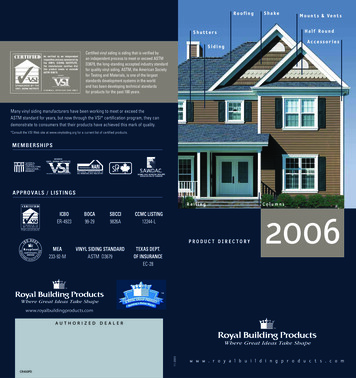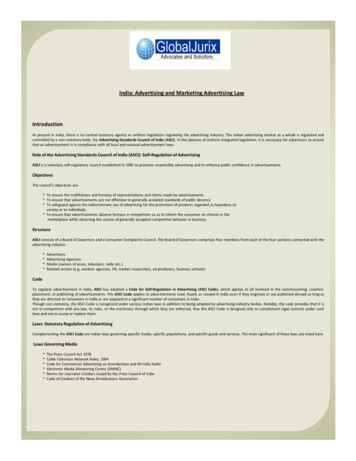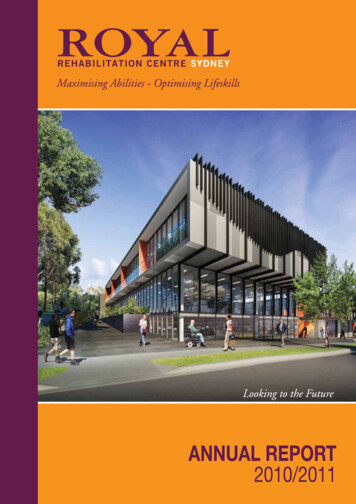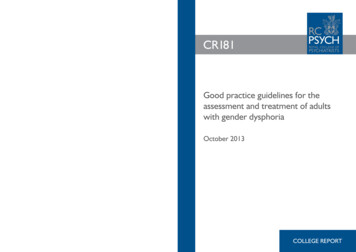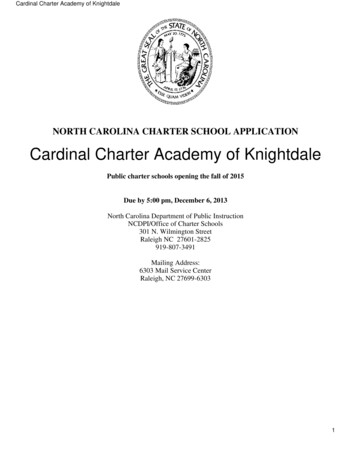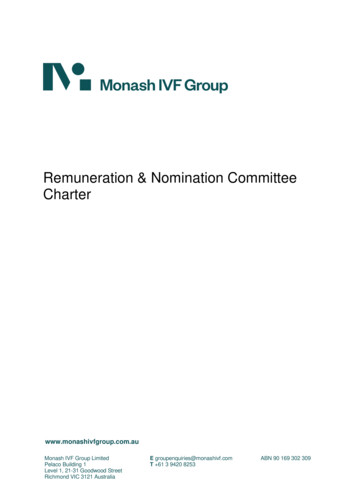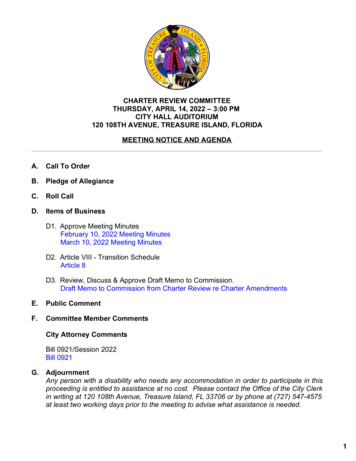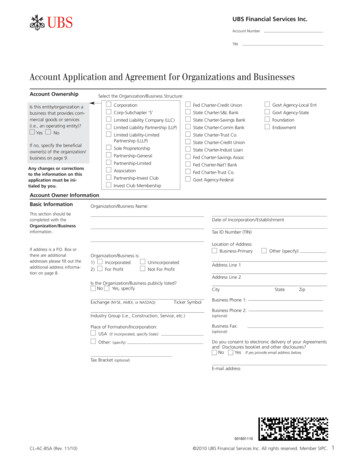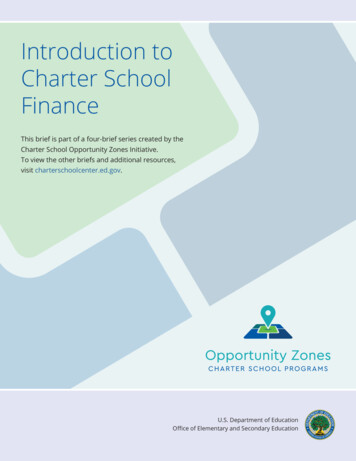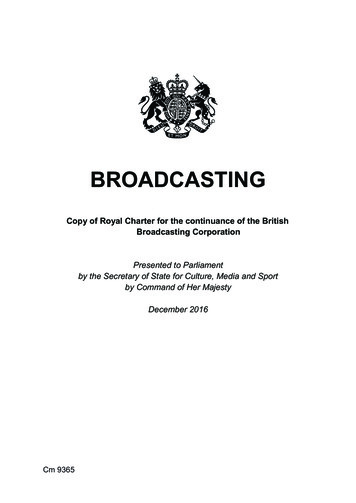
Transcription
BROADCASTINGCopy of Royal Charter for the continuance of the BritishBroadcasting CorporationPresented to Parliamentby the Secretary of State for Culture, Media and Sportby Command of Her MajestyDecember 2016Cm 9365
Crown copyright 2016This publication is licensed under the terms of the Open Government Licence v3.0except where otherwise stated. To view this licence,visit e/version/3 or write to theInformation Policy Team, The National Archives, Kew, London TW9 4DU, oremail: psi@nationalarchives.gsi.gov.uk.Where we have identified any third party copyright information you will need to obtainpermission from the copyright holders concerned.This publication is available at www.gov.uk/government/publicationsAny enquiries regarding this publication should be sent to usat enquiries@culture.gov.ukPrint ISBN 9781474138918Web ISBN 9781474138925ID P00284630112/16Printed on paper containing 75% recycled fibre content minimumPrinted in the UK by the Williams Lea Group on behalf of the Controller of HerMajesty’s Stationery Office
ROYAL CHARTER FOR THE CONTINUANCE OFTHE BRITISH BROADCASTING CORPORATIONELIZABETH THE SECOND by the Grace of God of the United Kingdom of GreatBritain and Northern Ireland and of Our other Realms and Territories Queen, Head ofthe Commonwealth, Defender of the Faith:TO ALL TO WHOM THESE PRESENTS SHALL COME, GREETING!WHEREAS on the 20th December 1926 by Letters made Patent under the Great Seal, OurRoyal Predecessor His Majesty King George the Fifth granted to the British BroadcastingCorporation (“the BBC”) a Charter of Incorporation:AND WHEREAS on various dates by Letters made Patent under the Great Seal, furtherCharters of Incorporation and Supplemental Charters have been granted to the BBC, thelast such Charter having been granted to the BBC on the 19th September 2006 (“the 2006Charter”):AND WHEREAS the period of incorporation of the BBC under the 2006 Charter will expireon the 31st December 2016 and it has been represented to Us by Our right and trusty andwell beloved Counsellor Karen Anne Bradley, Our Principal Secretary of State for Culture,Media and Sport, that it is expedient that the BBC should be continued for the periodending on the 31st December 2027 and that the objects, constitution, organisation andregulation of the BBC should be reformed so as to enable the BBC still better to serve theinterests of Our People:AND WHEREAS in view of the widespread interest which is taken by Our People inservices which provide audio and visual material by means of broadcasting, the internet orthe use of newer technologies, and of the great value of such services as means ofdisseminating information, education and entertainment, We believe it to be in the interestsof Our People that there should continue to be an independent corporation and that itshould provide such services, and be permitted to engage in other compatible activities,within a suitable legal framework:NOW KNOW YE that We by Our Prerogative Royal and of Our especial grace, certainknowledge and mere motion do by this Our Charter for Us, Our Heirs and Successors will,ordain and declare as follows:
INCORPORATION AND OBJECTS1.Incorporation of the BBC(1)The BBC shall continue to be a body corporate by the name of the BritishBroadcasting Corporation.(2)The members of the Board of the BBC shall be the members of the Corporation, butmembership of the Corporation shall not enable any individual to act otherwise thanthrough the Board.(3)Paragraph (2) is subject to article 25 (the Director General).(4)Additional and technical provisions about the BBC’s corporate nature and powers arecontained in article 52 (BBC’s corporate nature and powers).2.Term of Charter(1)This Charter will take effect as from the beginning of the Effective Date, but thatgeneral statement must be read subject to paragraph (2).(2)In technical terms, this Charter shall come into force on the day after the day onwhich it is granted (see the date given in the formal text following article 72 (generaldeclaration), but in order to facilitate the transition from the constitutional and otherarrangements in force under the 2006 Charter to those under this Charter, theSchedule modifies this Charter’s effect (in relation to times both during and after theTransitional Period, within the meaning given in the Schedule).(3)Subject to article 60 (dissolution and winding-up), this Charter shall continue in forceuntil the end of 31st December 2027.(4)The 2006 Charter is to continue to have effect until the end of 31st December 2016,but is also subject to the provisions of the Schedule to this Charter.(5)In this article, “the 2006 Charter” means the Royal Charter for the continuance of theBBC which came into force on 1st January 2007.3.The independence of the BBC(1)The BBC must be independent in all matters concerning the fulfilment of its Missionand the promotion of the Public Purposes, particularly as regards editorial andcreative decisions, the times and manner in which its output and services aresupplied, and in the management of its affairs.(2)Paragraph (1) is subject to any provision made by or under this Charter or theFramework Agreement or otherwise by law.
4.The BBC’s ObjectThe BBC’s Object is the fulfilment of its Mission and the promotion of the PublicPurposes.5.The BBC’s MissionThe Mission of the BBC is to act in the public interest, serving all audiences throughthe provision of impartial, high-quality and distinctive output and services whichinform, educate and entertain.6.The Public PurposesThe Public Purposes of the BBC are as follows.(1)To provide impartial news and information to help people understand andengage with the world around them: the BBC should provide duly accurate andimpartial news, current affairs and factual programming to build people’sunderstanding of all parts of the United Kingdom and of the wider world. Its contentshould be provided to the highest editorial standards. It should offer a range anddepth of analysis and content not widely available from other United Kingdom newsproviders, using the highest calibre presenters and journalists, and championingfreedom of expression, so that all audiences can engage fully with major local,regional, national, United Kingdom and global issues and participate in thedemocratic process, at all levels, as active and informed citizens.(2)To support learning for people of all ages: the BBC should help everyone learnabout different subjects in ways they will find accessible, engaging, inspiring andchallenging. The BBC should provide specialist educational content to help supportlearning for children and teenagers across the United Kingdom. It should encouragepeople to explore new subjects and participate in new activities through partnershipswith educational, sporting and cultural institutions.(3)To show the most creative, highest quality and distinctive output and services:the BBC should provide high-quality output in many different genres and across arange of services and platforms which sets the standard in the United Kingdom andinternationally. Its services should be distinctive from those provided elsewhere andshould take creative risks, even if not all succeed, in order to develop freshapproaches and innovative content.(4)To reflect, represent and serve the diverse communities of all of the UnitedKingdom’s nations and regions and, in doing so, support the creative economyacross the United Kingdom: the BBC should reflect the diversity of the UnitedKingdom both in its output and services. In doing so, the BBC should accurately andauthentically represent and portray the lives of the people of the United Kingdomtoday, and raise awareness of the different cultures and alternative viewpoints thatmake up its society. It should ensure that it provides output and services that meetthe needs of the United Kingdom’s nations, regions and communities. The BBC
should bring people together for shared experiences and help contribute to the socialcohesion and wellbeing of the United Kingdom. In commissioning and deliveringoutput the BBC should invest in the creative economies of each of the nations andcontribute to their development.(5)To reflect the United Kingdom, its culture and values to the world: the BBCshould provide high-quality news coverage to international audiences, firmly basedon British values of accuracy, impartiality, and fairness. Its international servicesshould put the United Kingdom in a world context, aiding understanding of the UnitedKingdom as a whole, including its nations and regions where appropriate. It shouldensure that it produces output and services which will be enjoyed by people in theUnited Kingdom and globally.7.The activities of the BBC(1)The only activities that may be carried out by the BBC are—(a)provision of the UK Public Services;(b)provision of the World Service;(c)non-service activities;(d)through commercial subsidiaries, commercial activities;(e)trading activities; and(f)the specified activities.(2)The activities referred to in paragraph (1) must be carried out in accordance with theterms of this Charter and the Framework Agreement.(3)The UK Public Services must fulfil the Mission and promote one or more of the PublicPurposes and consist of—(a)the existing services specified in the Framework Agreement; and(b)any activity aimed primarily at users in the United Kingdom involving theprovision of output supplied by means of—(i)television, radio and online services; or(ii)similar or related services which make output generally available andwhich may be in forms or use technologies which either have notpreviously been used by the BBC or which have yet to be developed.(4)The World Service consists of the broadcast or other distribution of output, and thedelivery of services, in English and other languages, aimed primarily at users outsidethe United Kingdom.(5)“Non-service activities” means activities which are not UK Public Services but whichdirectly or indirectly fulfil the Mission and promote one or more of the PublicPurposes. Such activities should support or enable the provision of the UK PublicServices and the World Service.(6)“Commercial activities” means activities which—(a)fit with the Mission and Public Purposes;(b)are not funded by licence fee revenue; and
(c)are undertaken with a view to generating a profit (regardless of whether theprofit generated will or may be used to fund the fulfilment of the Mission andthe promotion of the Public Purposes). This means that something can be acommercial activity even if it also promotes the Public Purposes, if it is donewith a view to generating profit.(7)“Trading activities” means activities which are commercial in nature but are excludedfrom the definition of commercial activities in the Framework Agreement.(8)The specified activities are those activities that the BBC is required to carry out by theFramework Agreement.GENERAL DUTIES8.IntroductionThe BBC, in exercising its functions in relation to the UK Public Services, the WorldService, non-service activities and trading activities, must comply with the generalduties in articles 9 to 17.9.Acting in the public interest(1)The BBC must act in the public interest.(2)In complying with this article, the BBC must—(a)ensure that the benefits (whether direct or indirect) of decisions relating to thefulfilment of its Mission and the promotion of the Public Purposes outweigh thecosts (whether direct or indirect); and(b)in doing so, have regard to economic, social and cultural benefits and costs.10.Engagement with the public(1)The BBC must carefully and appropriately assess the views and interests of thepublic and audiences, including licence fee payers, across the whole of the UnitedKingdom.(2)The BBC must make arrangements to ensure that the diverse perspectives andinterests of the public and audiences, including licence fee payers, across the wholeof the United Kingdom are taken into account in its decision-making.11.Market impact(1)The BBC must have particular regard to the effects of its activities on competition inthe United Kingdom.(2)In complying with this article, the BBC must(a)seek to avoid adverse impacts on competition which are not necessary for theeffective fulfilment of the Mission and the promotion of the Public Purposes;
(b)have regard to promoting positive impacts on the wider market.12.Openness, transparency and accountability(1)The BBC must observe high standards of openness and seek to maximisetransparency and accountability.(2)The BBC must ensure that the following are made public as soon as possible—(a)the minutes of the meetings of the Board;(b)important decisions (and reasons behind them and a summary of theevidence that supports them) concerning changes to the creative remit, workplan and material changes to the UK Public Services, non-service activities,and commercial activities; and(c)such other information (including minutes of the meetings of committees of theBoard) it is reasonable and proportionate to publish to comply with paragraph(1).(3)The BBC must have regard to the benefits of undertaking consultation with interestedpersons in relation to the functions set out in article 20 (principal functions of theBoard).(4)In complying with this article, the BBC is not required to publish or otherwise discloseinformation that it would not be required to disclose under the Freedom of InformationAct 2000.13.Partnership(1)The BBC must work collaboratively and seek to enter into partnerships with otherorganisations, particularly in the creative economy, where to do so would be in thepublic interest.(2)In complying with this article, the BBC must—(a)enter into partnerships, which, overall, are with a wide range of organisationsincluding commercial and non-commercial organisations and organisations ofall sizes, throughout the nations and regions of the United Kingdom, coveringtelevision, radio and online services; and(b)ensure that its partnerships are fair and beneficial to all organisations in thepartnership and, in particular, that partners are given due attribution andrecognition, including in the branding and promotion of the output andservices created or distributed.14.Diversity(1)The BBC must ensure it reflects the diverse communities of the whole of the UnitedKingdom in the content of its output, the means by which its output and services aredelivered (including where its activities are carried out and by whom) and in theorganisation and management of the BBC.
(2)The BBC must ensure that its output and services overall provide a duly accurate andauthentic portrayal and representation of the diverse communities of the whole of theUnited Kingdom.(3)The BBC must ensure that it assesses and meets the needs of the diversecommunities of the whole of the United Kingdom.(4)In complying with this article, the BBC must have particular regard to the need toreflect underrepresented communities.(5)The BBC must support the regional and minority languages of the United Kingdomthrough its output and services and through partnerships with other organisations.15.Technology(1)The BBC must promote technological innovation, and maintain a leading role inresearch and development, that supports the effective fulfilment of its Mission and thepromotion of the Public Purposes.(2)In complying with this article, the BBC must—(a)focus on technological innovation to support the delivery of the UK PublicServices, non-service activities and the World Service;(b)seek to work in partnership with other organisations; and(c)share, as far as is reasonable, its research and development knowledge andtechnologies.16.Stewardship of public money(1)The BBC must exercise rigorous stewardship of public money in accordance with thefollowing principles.(2)Regularity: the management of all of the BBC’s resources must accord with theprovisions of the Charter, Framework Agreement and other agreements the BBCenters into with Government Ministers.(3)Propriety: the management of all of the BBC’s resources must meet high standards ofpublic conduct, robust governance and duly consider the expectations of Parliament(including those of the Public Accounts Committee) which have been formallycommunicated to the BBC.(4)Value for money: procurement, projects and processes must be systematicallyevaluated and assessed to provide confidence about suitability, effectiveness,prudence, quality, value and avoidance of error and other waste, taking into accountthe wider public interest, not just that of the BBC itself.(5)Feasibility: proposals using public funds should be implemented accurately,sustainably and to the intended timetable.
17.Guidance and best practiceThe BBC, in exercising its functions, must have regard—(a)to such general guidance concerning the management of the affairs of publicbodies as it considers relevant and appropriate; and(b)to generally accepted principles of good corporate governance, but only:(i)where to do so would not be incompatible with sub-paragraph (a); and(ii)to the extent that such principles may reasonably be regarded asapplicable in relation to its functions and within the particularconstitution of the BBC as a chartered corporation.18.General duties in relation to commercial activitiesThe BBC, in exercising its functions in relation to the commercial activities, must—(a)comply with the duties in article 9 (acting in the public interest), article 10(engagement with the public) and article 12 (openness and transparency);(b)ensure that its commercial activities do not, as a result of their relationshipwith the UK Public Services, non-service activities or trading activities, distortthe market or gain an unfair competitive advantage.CONSTITUTION - THE BOARD19.Introduction(1)There shall be a Board of the BBC which, acting collectively, is responsible for theproper, effective and independent exercise of all the functions of the BBC inaccordance with the provisions set out in this Charter and the Framework Agreement.(2)In addition, the Board has all the functions expressly or impliedly conferred upon itelsewhere by or under this Charter or the Framework Agreement.(3)The Board may obtain independent advice to support the exercise of its functions.20.The principal functions of the Board(1)The principal functions of the Board are contained in this article.(2)In accordance with article 3 (independence of the BBC), each member of the Boardmust at all times uphold and protect the independence of the BBC including by actingin the public interest, exercising independent judgement and neither seeking nortaking instructions from Government Ministers or any other person.(3)The Board must ensure that the BBC fulfils its Mission and promotes the PublicPurposes by, in particular, setting—(a)the strategic direction for the BBC within the framework set by this Charterand the Framework Agreement;
(b)(c)(d)(e)(f)(g)(h)(i)(j)the creative remit (including the direction of the BBC’s editorial and creativeoutput and services and in regard to the nations and regions of the UnitedKingdom);the budgets for the UK Public Services and the World Service;a framework to assess the performance of the BBC in delivering its strategiesand creative remit, and obligations under this Charter and the FrameworkAgreement, including performance measures (and targets for those measureswhere appropriate) to assess the performance of the UK Public Services infulfilling the Mission and promoting the Public Purposes;a framework to assess the performance of the World Service;the standards for the BBC’s editorial and creative output and services;a framework within which the BBC must handle complaints;a policy on the distribution of the UK Public Services;a plan for compliance with each of the BBC’s general duties; anda strategy and governance arrangements for the BBC’s commercial activitiesand for assessing the effectiveness of those activities.(4)The Board must consider proposals for material changes to the UK Public Services,non-service activities or trading activities, and must assess both the public value andimpact on competition of such proposals.(5)The Board must consider proposals for material changes to the commercial activities,and must assess the proposed changes in terms of their alignment with the PublicPurposes, their commercial efficiency, their impact on the BBC’s reputation andwhether the proposed changes, as a result of their relationship with the UK PublicServices, trading activities or non-service activities, distort the market or create anunfair competitive advantage.(6)The Board must secure the effective and efficient management of the BBC and itscommercial subsidiaries by, in particular—(a)appointing, and holding to account, the management of the BBC;(b)ensuring that the organisational structure of the BBC and the skills of the staffof the BBC are fit for purpose; and(c)setting the terms and conditions for the staff of the BBC and reviewing theseregularly.(7)The Board must secure the effective and efficient management of the finances of theBBC by, in particular—(a)putting in place appropriate policies and controls to ensure that licence feeand other income is spent and operations are managed efficiently, effectivelyand in accordance with regularity, propriety, value for money and feasibility;and(b)ensuring that arrangements for the collection of the licence fee are efficient,appropriate and proportionate.(8)The Board must ensure compliance by the BBC with its obligations under thisCharter, the Framework Agreement, the Operating Framework and the general lawby, in particular—
(a)(b)(c)complying with requests made by Ofcom;complying with any decision made by Ofcom; andcomplying with any request made by or decision of Ofcom relating to thecommercial subsidiaries including ensuring that any necessary action is takenby commercial subsidiaries controlled by the BBC to give effect to a request ordecision.Without prejudice to any right of the BBC to seek appropriate legal remedies, whereit appears to the Board that their obligations under this Charter, the FrameworkAgreement and the Operating Framework conflict with any request or decision madeby Ofcom (who must take into account their obligation under article 45(2)(c)), theBoard must nevertheless comply with Ofcom’s request or decision.21.Composition of the Board(1)The Board must consist of a number of non-executive members (including the Chair)and a number of executive members. The total number of members must be 14.(2)The non-executive members of the Board must be the Chair, the four NationMembers and five other members.(3)The non-executive members of the Board must, with the agreement of the Secretaryof State, select one of their number to serve as Senior Independent Director, whoshall have a role that accords with the generally accepted principles of goodcorporate governance (to the extent that such principles may reasonably be regardedas applicable in relation to the Board’s functions and within the particular constitutionof the BBC as a chartered corporation).(4)The executive members of the Board must be the Director General and three othermembers.(5)The members of the Board must be selected to ensure that, collectively, they havethe range of skills and experience necessary to secure the proper exercise of thefunctions of the BBC.(6)The total number of members, the number of non-executive members and thenumber of executive members may, with the agreement of the BBC, be amended byOrder in Council.(7)It shall not be necessary to fix a lower number by Order in Council merely to reflectthe existence of a vacancy which is intended to be filled by a further appointment indue course.22.Appointment of the Chair of the Board(1)The Chair of the Board must be appointed by Order in Council.(2)The appointment may only be made following a fair and open competition.
(3)The Governance Code, including the public appointment principles, must be followedin making the appointment. The Commissioner for Public Appointments will ensurethat the appointment is made in accordance with the Governance Code.(4)The Secretary of State must consult the BBC on the process for appointing the Chair(including on the job specification, skills description and time commitment which mustbe developed to ensure that the requirements of article 21(5) (composition of theBoard) are met).(5)No recommendation may be made to Her Majesty in Council to appoint the Chairunless a pre-appointment hearing has been held and a report published by the SelectCommittee.(6)Whenever the office of Chair is vacant, the Secretary of State, having consulted theBoard, must appoint one of the non-executive members as ‘Acting Chair’ with all thepowers of the Chair until a new Chair is appointed.23.Non-executive Board members for the nations(1)A non-executive member of the Board must be designated—(a)the Board member for England;(b)the Board member for Scotland;(c)the Board member for Wales; and(d)the Board member for Northern Ireland,(“Nation Members”).(2)The Nation Members must be appointed by Order in Council.(3)The appointments may only be made following a fair and open competition.(4)The Governance Code, including the public appointment principles, must be followedin making the appointments. The Commissioner for Public Appointments will ensurethat the appointments are made in accordance with the Governance Code. TheChair must be a member of the selection panel for the appointment of the NationMembers and must have particular regard to article 21(5) (skills and experience ofBoard members).(5)No recommendation may be made to Her Majesty in Council to appoint a NationMember unless selected from those put forward by the selection panel.(6)Each person appointed under this article must be suitably qualified by virtue of—(a)having skills and experience that contribute to the work of the Board;(b)having knowledge of the culture, characteristics and affairs of the people inthe nation for which he or she is to be appointed; and(c)being in close touch with opinion in that nation.
(7)The Secretary of State must consult the BBC on the process for appointing theNation Members (including the job specification, skills description and timecommitment which must be developed to ensure that the requirements of article 21(5)are met).(8)No appointment shall be made for the Board member for Scotland without theagreement of the Scottish Ministers.(9)No appointment shall be made for the Board member for Wales without theagreement of the Welsh Ministers.(10)No appointment shall be made for the Board member for Northern Ireland without theagreement of the Executive Committee established by section 20 of the NorthernIreland Act 1998.(11)For the purposes of this article, “England” includes the Channel Islands and the Isleof Man and references to “nation” shall be interpreted accordingly.24.Other non-executive members of the Board(1)The other non-executive members of the Board must be appointed by the Board.However, the Board may only make an appointment which has been proposed to theBoard by the Nomination Committee (see article 31(4) (committees of the Board)).(2)For the purposes of this article, the roles of proposing and approving the making ofan appointment relate not only to the identity of the person to be appointed but alsothe terms of the appointment (see article 27 (the terms on which non-executivemembers of the Board serve)).(3)The BBC must have regard to and observe, where appropriate, the GovernanceCode, including the public appointment principles, in making the appointments.25.The Director General(1)There must be a Director General of the BBC.(2)The Director General must be the chief executive officer of the BBC. The DirectorGeneral must be an executive member of the Board.(3)The Director General must also be the editor-in-chief of the BBC. As such, theDirector General shall have final responsibility and is accountable to the Board forindividual decisions on the BBC’s editorial matters and creative output.26.Executive members of the Board(1)The executive members of the Board must be appointed by the Board. However, theBoard may only make an appointment which has been proposed by the NominationCommittee (see article 31 (committees of the Board)).
(2)For the purposes of this article, the roles of proposing and approving the making ofan appointment relate not only to the identity of the person to be appointed but also(subject to the requirements of article 29 (terms of executive members of the Board))the terms of his appointment.27.The terms on which non-executive members of the Board serve(1)The appointment of a non-executive member of the Board must be for a period of nolonger than four years but may be increased for up to a further year in exceptionalcircumstances. The period of the appointment must be specified in the terms ofappointment.(2)A serving non-executive member of the Board may at any time be reappointed onceonly by Order in Council or by the Board, in accordance with articles 22, 23 and 24(Chair and non-executive members) as the case may be, for any further periodspecified in the terms of appointment. Such a further period may not be longer thanfour years but may be increased for up to a further year in exceptional circumstances.The power may be exercised with effect from a date other than that on which theprevious term would have expired.(3)Non-executive members of the Board must be remunerated by the BBC at a ratedetermined by the Secretary of State.(4)The BBC must pay, or make provision for paying, to or in respect of any nonexecutive member of the Board, such amounts (if any) by way of pension, allowancesor gratuities as the Secretary of State may determine.28.Termination of office of non-executive members(1)A non-executive member of the Board ceases to hold office—(a)on the expiration of the period for which the member had most recently beenappointed (
(4) The 2006 Charter is to continue to have effect until the end of 31st December 2016, but is also subject to the provisions of the Schedule to this Charter. (5) In this article, "the 2006 Charter" means the Royal Charter for the continuance of the BBC which came into force on 1st January 2007. 3. The independence of the BBC
